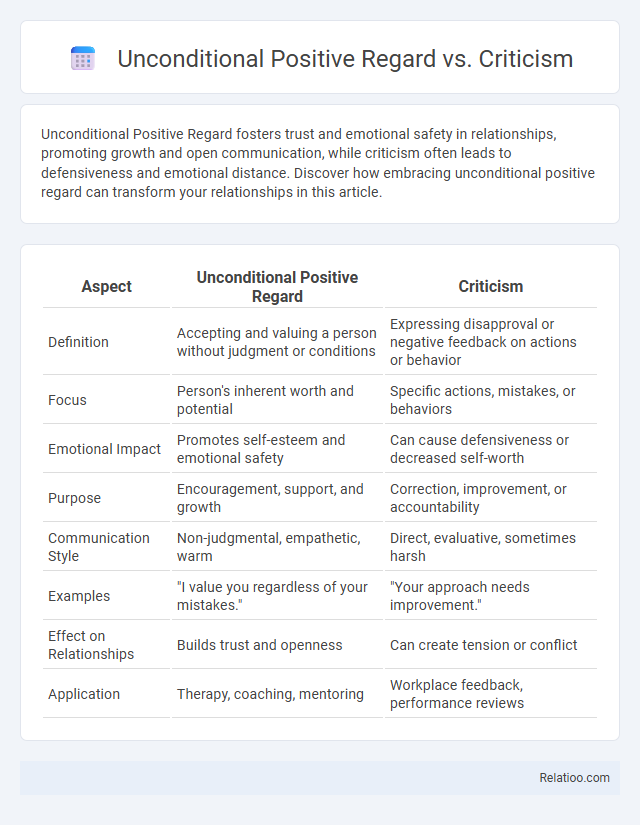Unconditional Positive Regard fosters trust and emotional safety in relationships, promoting growth and open communication, while criticism often leads to defensiveness and emotional distance. Discover how embracing unconditional positive regard can transform your relationships in this article.
Table of Comparison
| Aspect | Unconditional Positive Regard | Criticism |
|---|---|---|
| Definition | Accepting and valuing a person without judgment or conditions | Expressing disapproval or negative feedback on actions or behavior |
| Focus | Person's inherent worth and potential | Specific actions, mistakes, or behaviors |
| Emotional Impact | Promotes self-esteem and emotional safety | Can cause defensiveness or decreased self-worth |
| Purpose | Encouragement, support, and growth | Correction, improvement, or accountability |
| Communication Style | Non-judgmental, empathetic, warm | Direct, evaluative, sometimes harsh |
| Examples | "I value you regardless of your mistakes." | "Your approach needs improvement." |
| Effect on Relationships | Builds trust and openness | Can create tension or conflict |
| Application | Therapy, coaching, mentoring | Workplace feedback, performance reviews |
Understanding Unconditional Positive Regard
Understanding Unconditional Positive Regard involves recognizing a fundamental psychological concept where you accept and support another person without judgment or conditions, fostering genuine self-worth. Unlike criticism, which can damage self-esteem and create defensiveness, unconditional positive regard promotes emotional growth and open communication. Your ability to offer this non-judgmental acceptance plays a crucial role in strengthening relationships and enhancing personal development.
Defining Constructive and Destructive Criticism
Unconditional positive regard involves accepting and valuing a person without judgment, fostering psychological safety and growth. Constructive criticism provides specific, actionable feedback intended to improve behavior or performance while maintaining respect and encouragement. Destructive criticism undermines self-esteem by focusing on personal flaws or failures without offering solutions, often leading to discouragement and defensiveness.
Psychological Foundations of Acceptance and Critique
Unconditional Positive Regard, a core concept in humanistic psychology introduced by Carl Rogers, emphasizes accepting individuals without judgment, fostering psychological growth and self-acceptance. Criticism, contrastingly, often triggers defensive responses and undermines self-esteem, impeding emotional development and well-being. The psychological foundations of acceptance highlight the importance of empathy and non-judgmental understanding, whereas critique involves evaluative judgment that can either motivate improvement or create psychological resistance depending on its delivery and perception.
Emotional Impact: UPR vs. Criticism
Unconditional Positive Regard (UPR) fosters emotional safety by accepting and valuing Your feelings without judgment, promoting self-worth and openness. In contrast, criticism often triggers defensiveness, lowers self-esteem, and increases emotional distress by highlighting perceived flaws or failures. The emotional impact of UPR supports resilience and psychological growth, while criticism can hinder emotional well-being and personal development.
Effects on Personal Growth and Self-Esteem
Unconditional Positive Regard fosters personal growth by providing a secure environment where individuals feel valued without judgment, enhancing self-esteem through acceptance and encouragement. In contrast, criticism often undermines self-worth, triggering defensiveness or diminished confidence that hampers development and emotional resilience. Unconditional Positive Regard supports healthier self-concept formation by promoting authenticity and psychological safety, which nurtures sustained self-improvement and emotional well-being.
Unconditional Positive Regard in Relationships
Unconditional Positive Regard in relationships involves accepting and valuing a partner without judgment, fostering emotional safety and trust that promote deeper connection. Unlike criticism, which can undermine self-esteem and create barriers, this approach encourages open communication and personal growth by affirming inherent worth. Prioritizing Unconditional Positive Regard enhances relationship satisfaction and resilience, creating a supportive environment for mutual understanding and empathy.
The Role of Criticism in Motivation and Change
Criticism plays a crucial role in motivation and change by highlighting areas for improvement and fostering self-awareness, which can drive personal growth when delivered constructively. In contrast, unconditional positive regard provides nonjudgmental acceptance that boosts self-esteem and emotional security, creating a supportive environment for change. Balancing constructive criticism with unconditional positive regard enhances motivation by encouraging self-improvement while maintaining a sense of worth and acceptance.
Balancing Support and Feedback in Communication
Unconditional Positive Regard (UPR) involves accepting and valuing a person without judgment, fostering trust and open communication, while criticism often highlights faults, potentially triggering defensiveness and reducing openness. Balancing support and feedback requires delivering constructive criticism within a framework of UPR, ensuring the recipient feels respected and understood, which enhances motivation and personal growth. Effective communication integrates empathetic listening and affirming language to maintain support, even when addressing areas for improvement, creating a psychologically safe environment that promotes development.
Practical Ways to Cultivate Unconditional Positive Regard
Cultivating unconditional positive regard involves actively practicing empathy, nonjudgmental listening, and genuine acceptance of others regardless of their actions or beliefs. Setting aside personal biases, offering consistent support, and reinforcing individuals' strengths promote emotional safety and resilience. Creating an environment free from criticism fosters trust and encourages open communication, essential for healthy interpersonal relationships.
Choosing the Right Approach: UPR or Criticism?
Choosing between Unconditional Positive Regard (UPR) and criticism hinges on fostering growth and trust in relationships. UPR promotes acceptance and empathy, encouraging positive self-esteem and open communication, while criticism often triggers defensiveness and diminishes motivation. Your approach should prioritize UPR to create a supportive environment that nurtures personal development and lasting connection.

Infographic: Unconditional Positive Regard vs Criticism
 relatioo.com
relatioo.com